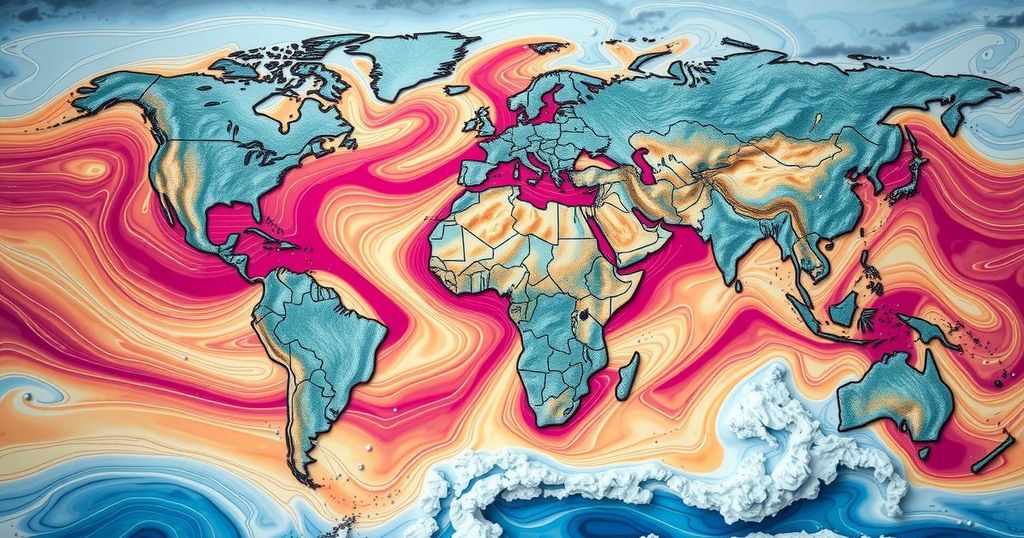Impact of Climate Change on Extreme Weather Events in 2025

Extreme weather in early 2025, including devastating wildfires and major winter storms, highlights the significant impact of climate change, which made 2024 the hottest year on record. Advances in climate science now allow researchers to link many weather events directly to human-caused climate change, revealing substantial shifts in temperature and weather patterns due to atmospheric alterations. This underscores the urgent need to confront rising global temperatures and their effects.
The onset of 2025 has been marked by extreme weather occurrences, with Southern California facing destructive wildfires fueled by winds exceeding 100 miles per hour and major winter storms affecting the Mid-Atlantic and southern regions of the United States. In the backdrop of these incidents, a significant report from global meteorological associations identified 2024 as the hottest year on record, driven primarily by human-induced climate change.
Historically, climate scientists hesitated to link individual weather events directly to climate change. However, advances in scientific techniques over the past decade have allowed researchers to establish connections between climatic shifts and phenomena such as heat waves, hurricanes, and wildfires. While not every weather change can be attributed to climate change, the correlation between the rise in global temperatures and extreme weather events has become evident, according to Justin Mankin, a climate scientist at Dartmouth College.
To comprehend the interplay between climate and weather, it is essential to note that climate represents the long-term average conditions, while weather refers to day-to-day variations. As illustrated by Danielle Touma from the University of Texas at Austin, one’s winter wardrobe signifies the climate of a region, though occasional warm days represent the variability of weather.
The Earth’s average temperature has escalated by approximately 1.3 degrees Celsius since the mid-1800s due to extensive fossil fuel combustion. This increase in temperature, while not always perceptibly affecting daily weather, influences it on a planetary scale. Deepti Singh of Washington State University articulates that contemporary weather phenomena occur within the context of a modified climate, leading to noticeable shifts in freezing days and an increase in heat extremes, with U.S. heat waves more than tripling since the 1960s.
Shifts in climate also alter complex atmospheric and oceanic patterns, introducing unprecedented weather events. For instance, the catastrophic heat wave in the Pacific Northwest in 2021 was significantly intensified by climate change, marking a deviation from historical atmospheric conditions. Alex Hall of UCLA reflects, “We’ve kind of put the climate on steroids,” highlighting the extraordinary nature of recent extreme weather occurrences.
Scientific innovations in “detection” and “attribution” methodologies have enabled researchers to model and compare climatic scenarios with and without human impacts. This facilitates the assessment of climate change’s influence on specific weather events. For example, Hurricane Helene’s rainfall intensity was found to be 10% greater, and the likelihood of its occurrence increased by at least 40%, compared to a scenario devoid of climate change.
In summary, the increasing frequency and intensity of extreme weather events can largely be attributed to human-induced climate change, as validated by scientific studies. As researchers continue to refine their methods for linking climate change with weather phenomena, it becomes increasingly critical to acknowledge and address the broader implications of our climatic choices.
This article discusses the relationship between extreme weather events and human-caused climate change, emphasizing the advancements in scientific understanding over recent years. It illustrates how climate change has been making weather events more extreme and frequent, citing examples from recent years, and explains the difference between climate and weather. Additionally, it highlights the methodologies used by scientists to attribute specific weather events to climate change and showcases how historical weather patterns are being disrupted by ongoing climatic shifts.
The article emphasizes that while not every weather event can be directly attributed to climate change, there is a clear and growing correlation between the two. The rise in global temperatures due to human activities has led to increased frequency and intensity of extreme weather events. With advancements in scientific techniques, researchers are better equipped to understand and explain these changes, underscoring the importance of addressing climate change to mitigate its impact on weather patterns.
Original Source: www.upr.org






